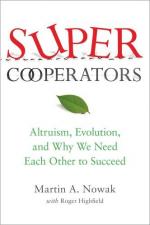|
This section contains 2,369 words (approx. 8 pages at 300 words per page) |

|
Altruism often is defined as an action intended to benefit another person even when that action could lead to sacrifices to the welfare of the actor. Altruism thus presents an issue for ethical reflection and a thorny problem for many scientific models of human behavior. It does not fit easily into the dominant theoretical paradigms of most behavioral sciences, which assume that self-interest is the drive that underlies human behavior. When presented with examples of altruism, analysts often dismiss them as too rare to be of practical significance or as representing self-interest in disguise. Scientific frameworks that continue to struggle with the theoretical challenge presented by altruism include evolutionary biology, whose paradigm suggests that altruistic behavior should be driven out by behavior guaranteed to produce greater evolutionary fitness; economics, which assumes that actors, whether they are people, firms, or countries, pursue perceived self-interest subject to information and opportunity...
|
This section contains 2,369 words (approx. 8 pages at 300 words per page) |

|


